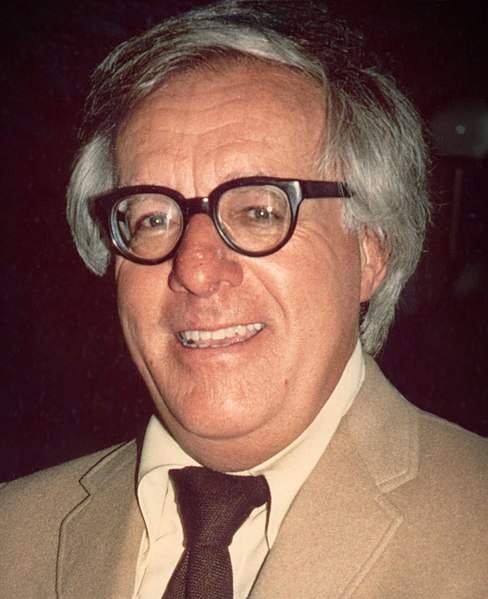Ray Bradbury, author of dozens of novels and hundreds of short stories, passed away last night at the age of 91.
When I saw the news today, I was immediately saddened by our collective loss of this creative genius. Soon, I began reflecting on my experience with Bradbury, and what his work has meant to me as a person and as a writer. I've read shamefully little of his vast output, but what I have read changed me forever.
 |
| 1920-2012 |
My first exposure to Mr. Bradbury came in the eighth grade, when my English teacher assigned Fahrenheit 451. How many of can say the exact same thing? Quite a few, I imagine. This dystopian novel, published in 1953, is recognized as part of the literary canon. It's become the default example of state-sponsored censorship. Firemen come not to extinguish conflagrations, but to burn books. Book lovers live in exile in the wilderness, fugitives from a society that suppresses the thought-provoking ideas found in literature.
 |
| You know who loved censorship? Nazis, that's who. They aren't even toasting marshmallows over those burning books. What a waste! |
Like everyone else, though, I came away from reading 451 with a profound aversion to censorship. My own feelings on the matter go beyond government-sanctioned censorship. I cannot abide censorship of any sort. Even the purveyors of the most repugnant, detestable ideas deserve the equal opportunity to put their ideas out into the world. This is not to say ideas should be immune to criticism. Not at all. Response in the form of agreement or criticism is a healthy part of the free speech process.
The Martian Chronicles is the other major Bradbury work that left an indelible mark on me. The volume is a collection of Bradbury's Martian tales, originally published as stand-alone short stories in various science fiction magazines. He stitched them together with the addition of a few new stories and vignettes, and the collection was released in 1950 in the form we know it today. Collectively, The Martian Chronicles tells the story of the colonization of Mars by humans and their conflict with the native Martian population. Failed expeditions and ambushes by the aboriginals invite comparison to the European colonization of the Americas and Africa. It is easier, perhaps, to contemplate the morality of colonizing an inhabited land when presented with a fictional setting, rather than reflecting on a fait accompli such as our own history here on Earth.
The stories from The Martian Chronicles have stayed with me, lingering always just on the edge of my awareness, in the almost twenty years since I first read them. There are times when I top a hill in the countryside, and am instantly taken to Mars, to "The Green Morning."
All about, like a moving current, a mountain river, came the new air, the oxygen blowing from the green trees. You could see it shimmer high in crystal billows. Oxygen, fresh, pure, green, cold oxygen turning the valley into a river delta.
 |
| I'm telling you, this is a great spot for a hot dog stand. |
"Usher II" creates a lush, Gothic atmosphere. I can never forget the recreation of literary horrors used to dispose of pesky Moral Climate Monitors. The final image of the house sinking into the ground after it has fulfilled its purpose is one that stays with me, too. Interestingly, this is Bradbury's anti-censorship story. Some backstory tells of a Great Burning of books, Fire Crews who incinerate them, and secret groups who collect and protect them. These will all appear again in Fahrenheit 451, of course--the novel which is most emphatically not about censorship.
"There Will Come Soft Rains" gives us a haunting, poignant glimpse of a post-nuclear war world without people. For a time, technology carries on, but nature ultimately reclaims her own. Finally, "The Million-Year Picnic" closes with a human family who has escaped the ravages of nuclear war on Earth and the troubles on Mars. They choose an abandoned human town on Mars in which to live, and then the father introduces his children to Martians: their own reflections in water.
Ray Bradbury taught me to actively love books, to cherish and protect the written word. He taught me the perils of censorship and to reject it at every turn. He took me to a distant planet, only to force me to confront problems here on Earth. Under Bradbury's guidance, I pondered ideas like racism, colonization, genocide, the environment, nuclear war, isolation, and identity. All dressed up as a trip to Mars.
 |
| I have donned my blacks. Show some respect, sirrah, and change your coat. |
As a writer, I stand in awe of Bradbury's command of the language. You cannot read a paragraph of his work without encountering a poetic turn of phrase. He teaches me to choose words with as much care as I outline the plot. He stands as an example of true artistry of the craft. He shows me that genre fiction can be just as profound, just as literary, as "literary" fiction. A label of "science fiction" or "romance" is not synonymous with mindless fluff. There is truth to be found in novels of every sort. Every writer can reveal humanity to itself in his or her own way.
We have lost a master. I mourn Ray Bradbury's passing, but am thankful for the lifetime of work he left behind for us to continue to study and enjoy. He has achieved immortality through his words. Though he is no longer with us, he will continue to take us to the stars and reveal our very souls.

You have inspired me to read Bradbury... I am ashamed to say, for the first time.
ReplyDelete